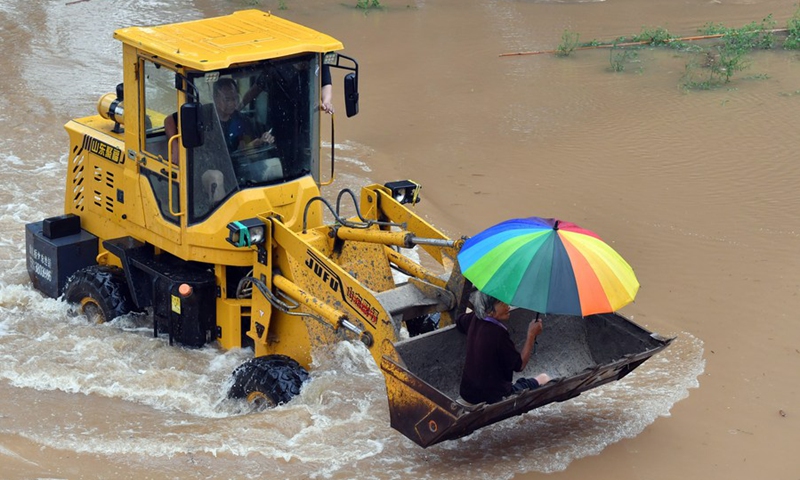
Staff members drive a shovel loader to help a local resident to evacuate from Huangzhuang Village in Weihui of Xinxiang, central China's Henan Province, July 22, 2021.(Photo: Xinhua)
The death toll in flood-hit Henan Province in central China has risen to 58 as record rainstorms wreaked havoc and five persons were reported missing as of 4 p.m. Saturday, according to a local government press briefing.
More than 9.3 million people across the province have been affected by the latest round of heavy downpours and floods. Over 1.1 million local residents have been relocated to safer places.
Li Changxun, deputy director of the provincial emergency management department, said between 7 a.m. Friday and 7 a.m. Saturday, torrential rains continued to lash areas in the cities of Luoyang, Pingdingshan, Shangqiu, Kaifeng and Hebi. Over the 24-hour period, six monitoring stations in Henan registered precipitation of over 50 mm.
Local rivers including Dasha and Anyang were swollen due to continual rainfall, and 13 large and 44 medium-sized reservoirs in the province saw water level exceed flood season marks.
Major transport routes in Henan blocked due to torrential rain affected the supply of thermal coal.
To ease thermal coal shortage in the province, China's railway system has unveiled a transportation plan, requiring major coal-producing areas including Shanxi, Shaanxi and Inner Mongolia to dispatch 60 coal trains to Henan each day, according to the China State Railway Group Co. Ltd.
To help restore local agricultural production, China on Saturday dispatched four teams comprising experts to the rainstorm-hit provinces of Henan and Hebei to mitigate losses due to the disaster, according to the Ministry of Agriculture and Rural Affairs.
The experts will conduct on-the-spot investigations to understand the condition of autumn grain crops, analyze and evaluate the impact caused by the disasters, and put forward measures for disaster prevention and mitigation, according to the ministry.
